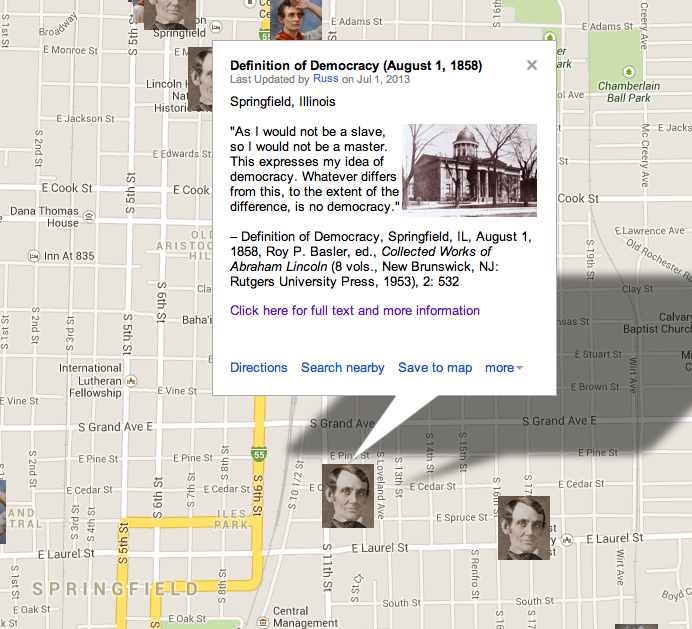Contributing Editors for this page include Canada Snyder
Ranking
#81 on the list of 150 Most Teachable Lincoln Documents
Annotated Transcript
On This Date
[Editorial Note: This undated fragment has traditionally been identified from the period in August 1858]
HD Daily Report, August 1, 1858
Close Readings
Canada Snyder, “Understanding Lincoln” blog post (via Quora), October 2, 2013
Custom Map
How Historians Interpret
“At Gettysburg, Lincoln connected democracy’s preservation with ‘a new birth of freedom,’ and on one earlier occasion, Lincoln appears to have defined the word ‘democracy’ in direct opposition to slavery. The provenance of the tantalizing document is questionable, as is the date, although the editors of his collected work conjectured that he wrote it on August 1, 1858. ‘As I would not be a slave, so I would not be a master, the scrap of paper reads, apparently in Lincoln’s handwriting. ‘This expresses my idea of democracy. Whatever differs from this, to the extent of the difference, is no democracy.’ If Lincoln indeed wrote these words, he understood the meaning of democracy to embrace legal and social relations between humans as well as a political system: a democratic polity could never tolerate the essentially undemocratic condition of masters and slaves. By this definition, the slave South was no democracy. And by this definition, the crisis of democracy predated Southern secession.”
–Sean Wilentz, “Democracy at Gettysburg,” in The Gettysburg Address: Perspectives on Lincoln’s Greatest Speech ed. Sean Conant (New York: Oxford University Press, 2015), 53-54.
“And yet Lincoln’s definition of democracy in terms of slavery, however questionable as political science, cut to the heart of his thinking. It was certainly more than a mere political device; indeed he never appears to have used it in public. It becomes fully meaningful only if one recognizes that after 1854 slavery became the most direct antithesis of the American Dream I his thought, the diametrical opposite of the central idea of the Republic. If his definition of democracy is restated as follows, it still remains questionable political theory, but it will express his meaning in more accurate terms: As I would not want my chance to rise in life obstructed, so I would not want to obstruct the chance of others to rise. This expresses my idea of democracy. Whatever differs from this, to the extent of the difference, is no democracy.”
–G.S. Boritt, Lincoln and the Economics of the American Dream (Urbana: University of Illinois Press, 1978), 276.
“Although Andrew Jackson had said, ‘Never for a moment believe that the great body of the citizens … can deliberately intend to do wrong,’ Lincoln was dubious. His view of ‘the people’ consistently was cast within discussions of government, laws, the need for restraint. He was so little committed to Jackson’s shibboleth that although he analyzed other political concepts at length, he gave posterity a thirty-three-word definition of democracy. Lincoln was no democrat as the word was understood in his century. It is not surprising then that he left the Democratic party his father had supported and joined the Whigs.”
–Phillip S. Paludan, “Lincoln’s Prewar Constitutional Vision,” Journal of the Abraham Lincoln Association 15, no. 2 (1994): 1-21.
NOTE TO READERS
This page is under construction and will be developed further by students in the new “Understanding Lincoln” online course sponsored by the House Divided Project at Dickinson College and the Gilder Lehrman Institute of American History. To find out more about the course and to see some of our videotaped class sessions, including virtual field trips to Ford’s Theatre and Gettysburg, please visit our Livestream page at http://new.livestream.com/gilderlehrman/lincoln

